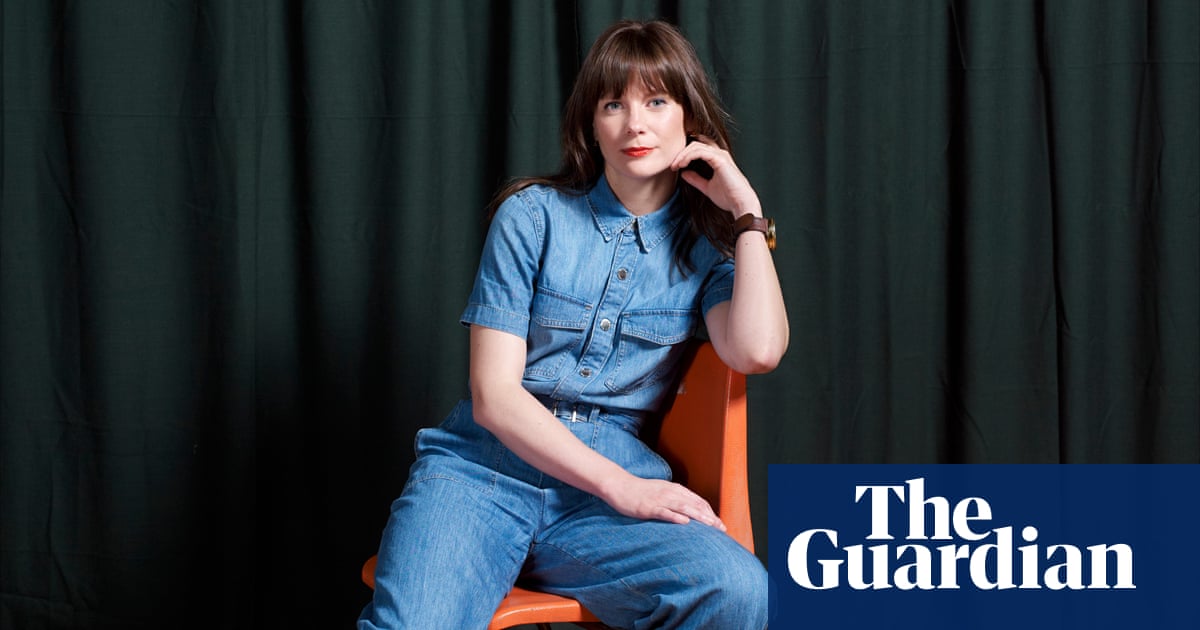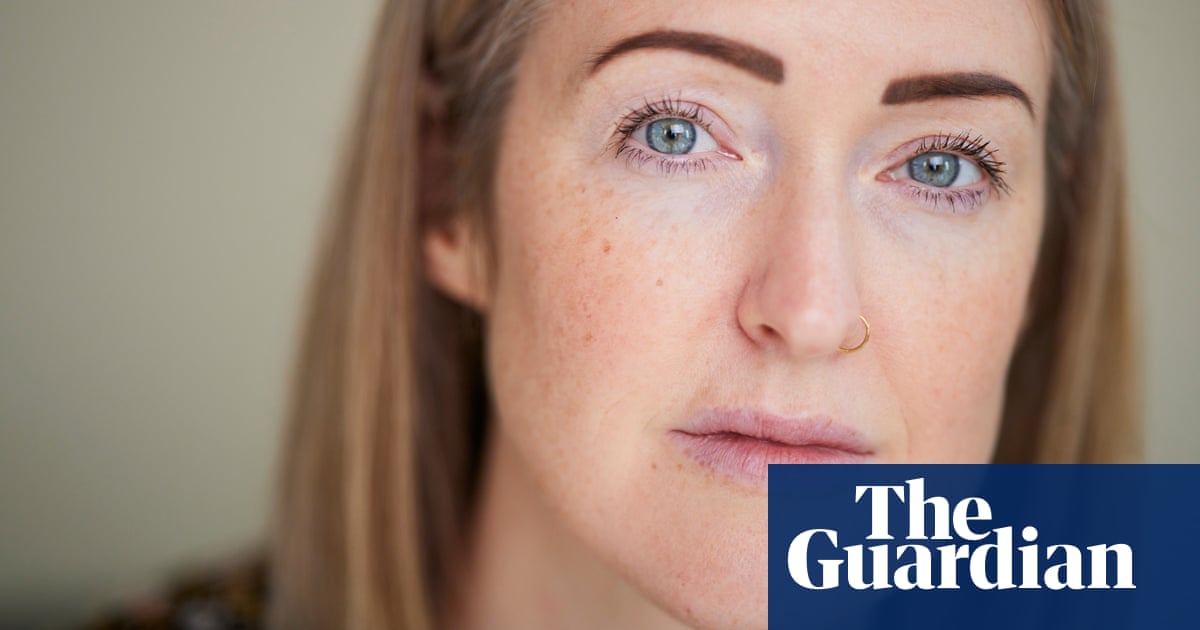
‘Iwas super-psyched,” says Kurt Vile, legs bouncing as he perches on the edge of an orange chair. “Just grateful for the gig.” The singer-songwriter is speaking from the basement of his century-old Philadelphia home, taking it easy in the corner of the studio he designed for himself as a hideout for when he’s overwhelmed or nervous. “I hadn’t played in so long,” he explains.
Vile is talking about the time, back in November 2020, when Seth Meyers asked him to perform John Prine’s Speed of the Sound of Loneliness on his talkshow. It would be the first time anyone had performed live on the show in eight months, owing to the pandemic, and Vile relished the challenge. Vile is a Prine devotee, as is Meyers, and it would also serve as a tribute: Prine had died of Covid seven months earlier.
But the dream soon became a nightmare. As a car took Vile to New York, his back started to throb. At the TV studio, the makeup artist stood on the other side of the dressing room door and told him how to apply blusher. What’s more, Vile had decided to shift the song’s tempo from its usual trot to make it his own, speeding up some bits and slowing others. As he rehearsed alone backstage, however, he worried that he was making a mistake. When the show aired the next day, on Thanksgiving, his fears were confirmed. “People said I had just butchered that song, that John was rolling in his grave.” Vile gives a meek laugh, leaning back so far in his chair he almost disappears. “I felt like I let John Prine down. I spiralled.”
That night, Vile slipped away from the family Thanksgivings celebrations and fell into an all-consuming spell of self-doubt, playing guitar and working through his despair alone. By the time he went to bed, he had written Like Exploding Stones, a candid take on his own failures. Synthesisers unwind as he strums his strings, singing slowly about simpler times while ruminating over performance anxieties and the pressure of life in the public eye. “It was,” he says, “an exorcism.”
Vile – still skinny and fresh-faced at 42, with a sense of boyish elan – has specialised in carefree stoner jams full of tunefully muttered quips for nearly two decades now. Though written in first-person, his inscrutable songs have long felt resistant to ready interpretation, so the candour of Like Exploding Stones is a fundamental shift. The slow-burning, seven-minute song, recorded as Vile’s band jammed over the tape he made that night, is the first single from (watch my moves), his first album in four years and his most personal yet.
It’s also his major-label debut, recorded in the home studio he built with cash from Verve Records. It’s a bold departure from someone who passes as a perpetual teenage skateboarder, clad in flannel and a Cate Le Bon T-shirt, with his basement shower full of skateboards and guitars. “I can be in arenas,” he says, likening himself to Willie Nelson or Bob Dylan. “I know I have the ability, the chops, the songs. And I like the idea of having songs in pop charts, of connecting with people. I have those capabilities.” But can he do all that and hold onto his peculiarity, while dealing with the anxieties these opportunities can bring?
Vile talks about his music with intensity and gets frustrated when his breezy songs are seen as tossed off: he believes his last record, 2018’s Bottle It In, was misunderstood, the intricacy overlooked. “That was a deep album. I get so deep and work so hard. I want to blow minds.” He gives a high, impish laugh that’s more of a howl. “I very rarely let music through that might be embarrassing, that I’m not crazy proud of.”
Making records became Vile’s raison d’etre soon after his father, a bluegrass obsessive, gave him a banjo for his 14th birthday. He skipped college and moved from the Philadelphia suburbs to downtown, cobbling together a living from various jobs while compiling tapes and recording with his friends and roommates, the War on Drugs. Soon after their 2008 debut, Vile left those psychedelic heartland rockers and signed to Matador, his career bubbling up as indie music trickled into the mainstream. When Matador asked him for a single after he’d been there for more than five years, Vile wrote Pretty Pimpin. “I was trying to write a hit song,” he says, “and I did.” The song has now had 92m Spotify streams. “I’ve touched that area enough that I know I can go there again. I want to do that with every song now, in different ways.”
Vile felt he had plateaued within indie, where each new record was trotted out much like the last. “It’s always one little step,” says Vile, who avoids eye contact by staring at the floor until he lands on a point he likes, as he does now. “I put everything I have into all my records and, by the end, I am depleted. How many more times can I do that without trying something new?”
After Vile participated in a tribute to the Velvet Underground on the Universal subsidiary Verve, executives there asked about his plans. Newly 40 and at the end of his Matador deal, he reckoned the time had come to jump, not least because Verve’s extended family included the Velvets, as well as Alice and John Coltrane. “I have always been a hustler, thinking about what’s next,” he says. “This was my opportunity to see what happened.”
On 11 March 2020, Vile met his longtime manager, Rennie Jaffe, in Philadelphia to sign his new contract and celebrate. Later that night, Donald Trump announced a travel ban, in response to Covid. Despite Vile’s ambitions, this sudden pause and cancellation of his upcoming tour brought a whiff of relief. The musician had struggled for years with what he calls “ping-pong psyche”, thinking more about what was coming next than what was happening now. Part of him longed for the sort of at-home stability the pandemic offered.
Stuck in Philly, Vile developed a routine, aided by the fact he had quit drinking the previous year (and smoking weed, more or less). He was in bed by 10pm and up by 7am to drink coffee and read about music before recording until the evening. His daughters – Delphine, nine, and Awilda, 11 – studied upstairs with their mum, Suzanne Lang, Vile’s wife of nearly 20 years. His world got smaller. “We have such beautiful trees here,” he says. “I just started thinking about them.”
Vile used the Verve funds to turn his basement into his dream studio, christened OKV Central. The studio is an extension of Vile’s already musical home: in an upstairs room, an organ and piano sit surrounded by books, records and sketchpads. Stacks of albums and tapes crowd every corner of the basement, with the walls serving as shrines to bands Vile loves: Neil Young box sets, Dinosaur Jr setlists, ZZ Top cassettes, Silver Jews liner notes. Vile picks up a photo of the rapper Schoolly D and beams: “Philly pride!”
This continuum between work and home life feeds into the new songs, which are confessional in a way Vile has rarely been. Despite his bluster about success and stardom, (watch my moves) is intimate and unguarded, a record of pandemic-era domesticity. “Write about what you see around you,” he croons on the string-laced beauty Chazzy Don’t Mind. “Children and flowers / And days for hours.” The lyrics take in kids’ toys on the windowsill, favourite records on the stereo, new growth in old gardens. His brother Sam and his nephew Coda star in the video for Mount Airy Hill (Way Gone), while his daughters flank their father – hiding behind an alligator mask, naturally – on the album cover.
Vile laments the world’s crises during Jesus on a Wire, a charming country number. Playing guitar at home, he concludes, might be all he can do to help now. He agrees that this is his “homecoming” record, acknowledging that the next step – setting off on tour to promote it – may not be easy.
“I’m finally coming into my own here, in the woods making music on my own,” he says later by phone, three days into band practice. He slips outside for the first time since rehearsals began and adds: “But in reality, I’m about to get thrown back into these insane times, with all their anxieties.” As his voice trails off, he notes that the weather is wonderful, though he doesn’t know if it will stay that way for long.












